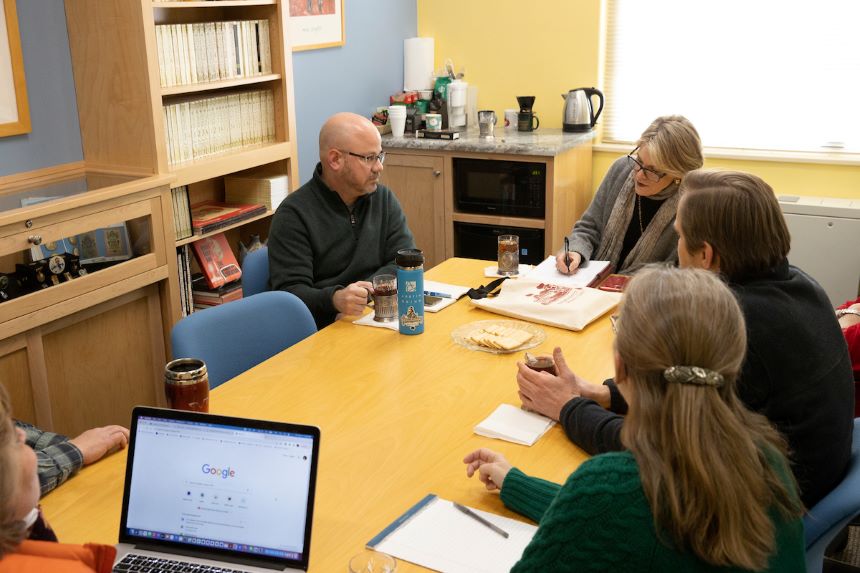
Department Chairs Learning Community for Enhancing Leadership and Productive Change
Providing opportunities to discuss the challenges and opportunities encountered by chairpersons.
Eligibility
This community offers department chairs a year-long opportunity to enhance their interests and skills in leadership through seminars, development projects, and peer support from a learning community of administrators in other disciplines. The facilitator will select up to twelve participants.
Amount
Each participant will receive $750 in professional development funds.
Deadline for Application Submission
August 18, 2025
Purpose and Description
This learning community will provide an opportunity to discuss challenges and opportunities encountered by chairs. Participants will determine the topics for seminars and workshops for the Faculty Learning Community (FLC).
- Program goals include facilitating collective wisdom and "best practices" of participants.
- Providing a support system for academic leaders.
- Introducing participants to the myriad possibilities for leading colleagues in the enhancement of teaching, scholarship, and service in this year of dynamic change.
Possible issues that the participants in this community might choose to study in depth include (but are not limited to):
- Enhancing personal productivity (juggling the roles of administrator, faculty member, scholar, teacher, counselor, advocate, entrepreneur, mentor, politician, and friend).
- Mediating administrative and faculty ideas and priorities, including views of change.
- Leadership styles and leading in times of change, uncertaintity, and continuous improvement.
- The difference between leadership and administrative roles.
- Developing staff management skills.
- Developing trust.
- Personal empowerment.
- Positive political skills.
- Faculty assessment.
- Mentoring junior faculty.
- Avoiding professional "burnout.'
Selection Criteria
The facilitator will select up to twelve participants. Criteria for selection include a commitment to excellent leadership, a level of interest in the program, need, openness to new ideas, the potential for contributions to the program, and plans for use of the award year. Participants will be chosen to create a diverse group representing a variety of disciplines, experiences, and needs.
Members
- Amanda Alexander, Art
- Chi-Hao Cheng, Electrical & Computer Engineering
- Carole Dabney-Smith, Chemistry & Biochemistry
- Anna Ghazaryan, Mathematics
- Liz Martin-Malikian, Architecture & Interior Design
- Thembinkosi Mkhatshwa, Mathematical & Physical Sciences
- Matt Omasta, Theatre
- Donna Scarborough, Speech Pathology & Audiology, Facilitator
- Leonard "Jay" Smart, Psychology
- Amanda Alexander, Art, Member
- Marcia England, Geography, Facilitator
- Anne Farrell, Accountancy, Member
- Mila Ganeva, German, Russian, Asian, and Middle Eastern Languages & Cultures, Member
- Anna Ghazaryan, Mathematics, Member
- Kimberly Hamlin, History, Member
- Jenny Minier, Economics, Member
- Thembinkosi Mkhatshwa, Mathematical & Physical Sciences, Member
- Stephanie Nicely, Nursing, Member
- Matt Omasta, Theatre, Member
- Rosemary Pennington, Media, Journalism & Film, Member
- Donna Scarborough, Speech Pathology & Audiology, Member
- Jason Abbitt, Educational Psychology, Facilitator
- Amanda Alexander, Art
- Anna Ghazaryan, Mathematics
- Bob Davis, Statistics
- Christopher Howell, College of Arts and Science
- Jenny Minier, Economics
- L. James Smart, Psychology
- Marcia England, Geography
- Matt Omasta, Theatre
- Melissa Chase, Sport Leadership and Management
- Mila Ganeva, German Russian Asian and Middle Eastern Languages and Cultures
- Stephanie Nicely, Nursing
- Zhi Yong Yang, Marketing
- Jason Abbitt, Educational Psychology, Facilitator
- Amanda Alexander, Art
- Anna Ghazaryan, Mathematics
- Bob Davis, Statistics
- Christopher Howell, College of Arts and Science
- Jenny Minier, Economics
- L. James Smart, Psychology
- Marcia England, Geography
- Matt Omasta, Theatre
- Melissa Chase, Sport Leadership and Management
- Mila Ganeva, German Russian Asian and Middle Eastern Languages and Cultures
- Stephanie Nicely, Nursing
- Zhi Yong Yang, Marketing
- Jason Abbitt, Educational Psychology
- Marcia England, Geography
- Mila Ganeva, German, Russian, Asian, and Middle Eastern Languages and Cultures
- Xiaowen Huang, Management
- Allen McConnell, Psychology, Facilitator
- Luis Pradanos, Spanish and Portuguese
- Michael Bailey-Van Kuren, Emerging Technology in Business and Design
- Mert Bal, Engineering Technology
- M. Cameron Hay-Rollins, Anthropology, Facilitator
- Elisabeth Hodges, French and Italian
- Gary Lorigan, Chemistry and Biochemistry
- Michael McCarthy, Marketing
- Kenneth Wireback, Spanish and Portuguese
- Helaine Alessio, Kinesiology and Health
- Bruce Drushel, Media, Journalism and Film
- Marcia England, Geography
- Cameron Hay-Rollins, Anthropology, Facilitator
- Keith Hohn, Chemical, Paper, and Biomedical Engineering
- Vahagn Manukian, Mathematical and Physical Science
- Allen McConnell, Psychology
- Elaine Miller, Philosophy
- Byran Ashenbaum, Management
- Susan Brehm, Speech Pathology and Audiology
- Graham Cairns, Architecture and Interior Design
- John Forren, Justice and Community Studies
- Herbert Jaeger, Physics
- Michael McCarthy, Marketing
- Marianne Murphy, Computer and Information Technology
- Robert Robbins, Art
- Susan Spellman, Humanities and Creative Arts
- Elisabeth Widom, Geology and Environmental Earth Science, Facilitator
- Helaine Alessio, Kinesiology and Health
- Timothy Cameron, Mechanical and Manufacturing Engineering
- Richard Campbell, Media, Journalism and Film
- Michael Crowder, Chair, Chemistry and Biochemistry, Facilitator
- Julia Guichard, Theatre
- Cameron Hay-Rollins, Anthropology
- Joseph Johnson, Psychology
- James Kiper, Computer Science and Software Engineering
- Susan Marine, Mathematics and Physical Sciences
- Bryan Marshall, Political Science
- Carol Olausen, Arts and Science
- Mary Rogero, Architecture and Interior Design
- Elisabeth Widom, Geology and Environmental Earth Science
- Roscoe Wilson, Humanities and Creative Arts
- Whitney Womack Smith, Languages, Literatures and Writing
- A. John Bailer, Chair, Statistics, Facilitator
- Tim Cameron, Mechanical and Manufacturing Engineering
- Michael Crowder, Chemistry/Biochemistry
- Wietse de Boer, History
- Kathleen Knight-Abowitz, Educational Leadership
- Stephen Lippmann, Sociology and Gerontology
- Elise Radina, Family Studies and Social Work
